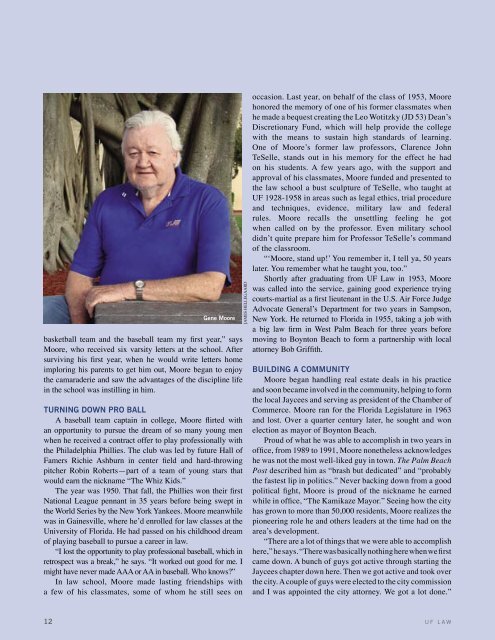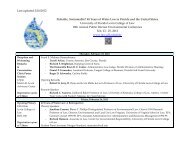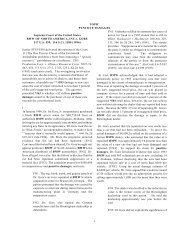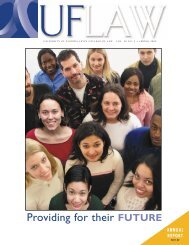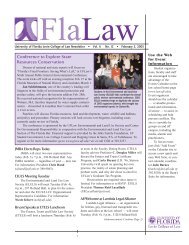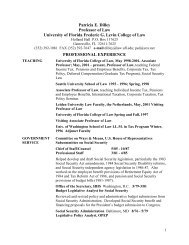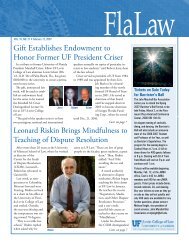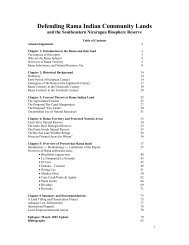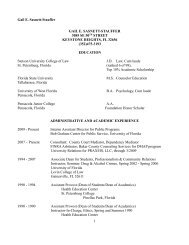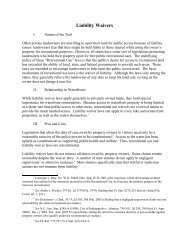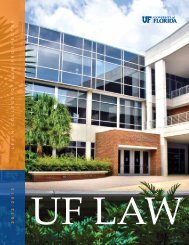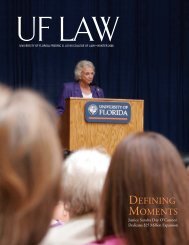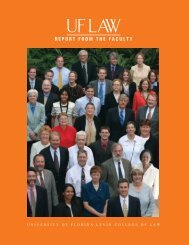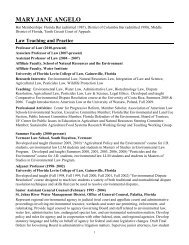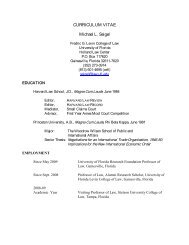Download Magazine - Levin College of Law - University of Florida
Download Magazine - Levin College of Law - University of Florida
Download Magazine - Levin College of Law - University of Florida
You also want an ePaper? Increase the reach of your titles
YUMPU automatically turns print PDFs into web optimized ePapers that Google loves.
Gene Moore<br />
basketball team and the baseball team my first year,” says<br />
Moore, who received six varsity letters at the school. After<br />
surviving his first year, when he would write letters home<br />
imploring his parents to get him out, Moore began to enjoy<br />
the camaraderie and saw the advantages <strong>of</strong> the discipline life<br />
in the school was instilling in him.<br />
TURNING DOWN PRO BALL<br />
A baseball team captain in college, Moore flirted with<br />
an opportunity to pursue the dream <strong>of</strong> so many young men<br />
when he received a contract <strong>of</strong>fer to play pr<strong>of</strong>essionally with<br />
the Philadelphia Phillies. The club was led by future Hall <strong>of</strong><br />
Famers Richie Ashburn in center field and hard-throwing<br />
pitcher Robin Roberts—part <strong>of</strong> a team <strong>of</strong> young stars that<br />
would earn the nickname “The Whiz Kids.”<br />
The year was 1950. That fall, the Phillies won their first<br />
National League pennant in 35 years before being swept in<br />
the World Series by the New York Yankees. Moore meanwhile<br />
was in Gainesville, where heʼd enrolled for law classes at the<br />
<strong>University</strong> <strong>of</strong> <strong>Florida</strong>. He had passed on his childhood dream<br />
<strong>of</strong> playing baseball to pursue a career in law.<br />
“I lost the opportunity to play pr<strong>of</strong>essional baseball, which in<br />
retrospect was a break,” he says. “It worked out good for me. I<br />
might have never made AAA or AA in baseball. Who knows”<br />
In law school, Moore made lasting friendships with<br />
a few <strong>of</strong> his classmates, some <strong>of</strong> whom he still sees on<br />
JAMES HELLEGAARD<br />
occasion. Last year, on behalf <strong>of</strong> the class <strong>of</strong> 1953, Moore<br />
honored the memory <strong>of</strong> one <strong>of</strong> his former classmates when<br />
he made a bequest creating the Leo Wotitzky (JD 53) Deanʼs<br />
Discretionary Fund, which will help provide the college<br />
with the means to sustain high standards <strong>of</strong> learning.<br />
One <strong>of</strong> Mooreʼs former law pr<strong>of</strong>essors, Clarence John<br />
TeSelle, stands out in his memory for the effect he had<br />
on his students. A few years ago, with the support and<br />
approval <strong>of</strong> his classmates, Moore funded and presented to<br />
the law school a bust sculpture <strong>of</strong> TeSelle, who taught at<br />
UF 1928-1958 in areas such as legal ethics, trial procedure<br />
and techniques, evidence, military law and federal<br />
rules. Moore recalls the unsettling feeling he got<br />
when called on by the pr<strong>of</strong>essor. Even military school<br />
didnʼt quite prepare him for Pr<strong>of</strong>essor TeSelleʼs command<br />
<strong>of</strong> the classroom.<br />
“ʻMoore, stand up!ʼ You remember it, I tell ya, 50 years<br />
later. You remember what he taught you, too.”<br />
Shortly after graduating from UF <strong>Law</strong> in 1953, Moore<br />
was called into the service, gaining good experience trying<br />
courts-martial as a first lieutenant in the U.S. Air Force Judge<br />
Advocate Generalʼs Department for two years in Sampson,<br />
New York. He returned to <strong>Florida</strong> in 1955, taking a job with<br />
a big law firm in West Palm Beach for three years before<br />
moving to Boynton Beach to form a partnership with local<br />
attorney Bob Griffith.<br />
BUILDING A COMMUNITY<br />
Moore began handling real estate deals in his practice<br />
and soon became involved in the community, helping to form<br />
the local Jaycees and serving as president <strong>of</strong> the Chamber <strong>of</strong><br />
Commerce. Moore ran for the <strong>Florida</strong> Legislature in 1963<br />
and lost. Over a quarter century later, he sought and won<br />
election as mayor <strong>of</strong> Boynton Beach.<br />
Proud <strong>of</strong> what he was able to accomplish in two years in<br />
<strong>of</strong>fice, from 1989 to 1991, Moore nonetheless acknowledges<br />
he was not the most well-liked guy in town. The Palm Beach<br />
Post described him as “brash but dedicated” and “probably<br />
the fastest lip in politics.” Never backing down from a good<br />
political fight, Moore is proud <strong>of</strong> the nickname he earned<br />
while in <strong>of</strong>fice, “The Kamikaze Mayor.” Seeing how the city<br />
has grown to more than 50,000 residents, Moore realizes the<br />
pioneering role he and others leaders at the time had on the<br />
areaʼs development.<br />
“There are a lot <strong>of</strong> things that we were able to accomplish<br />
here,” he says. “There was basically nothing here when we first<br />
came down. A bunch <strong>of</strong> guys got active through starting the<br />
Jaycees chapter down here. Then we got active and took over<br />
the city. A couple <strong>of</strong> guys were elected to the city commission<br />
and I was appointed the city attorney. We got a lot done.”<br />
12 U F L A W


